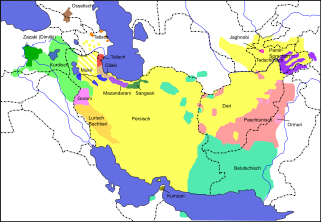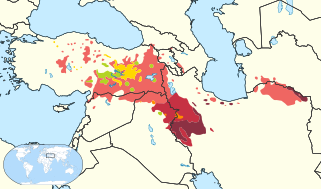Il Curdo è la lingua del Kurdistan, è usata da circa 35 millioni di persone in molti paesi diversi:
Il Kurdistan è separato tra: la Turchia, l’Iran, l’Iraq e la Siria
Il Curdo è una lingua indo-europea e apartiene alle lingue iraniane, è collegato ad altre lingue come il Perso / il Farsi, il Dari (in Afganistan), il Beluchi (in Iran, Afganistan e in Pakistan) e il Paschtu (in Afghanistan e in Pakistan).

Il Curdo può essere sub-differenziato in dialetti:
-Kurmandji
- Sorani
- Zazaki
- Gorani
- Curdo del Sud

Nel corso dei secoli la storia il Curdo era sempre in contatto con altre lingue come l’Aramaico, l’Arabo, l’Armeniano e il Turco; nel passato recente il Curso ha anche stato influenzato da altre lingue europee.
Un fenomeno speciale della lingua curda può essere trovato tra i verbi: il Kurmandji (il dialetto nord / ovest) utilizza l’ergativo - al contrario alla piuparte delle lingue indo-europee.
I soggetti logici appariscono come oggetti quando il verbo è ergativo. Il soggetto grammaticale non è uguale con il soggetto logico.
Alcuni esempi di altre lingue:
- Tedesco: es geschieht mir - mi affetta
- Francese: ça me plaît - mi piace
In Kurmandji, l’agente, la persona chi è attiva, non è in Casus Rectus (Nominativo), ma in Casus Obliquus (Accusativo, Dativo, Genitivo).
L’ergativo è utilizzato con i verbi transitivi.
Esempio: (Io) ti vedevo.
| Obliquus | Rectus |
Verbe |
Min |
tu |
dîtî. |
Mi |
tu |
vedevo. |
Non c’è l’ergativo con i verbi intransitivi.
Esempio: (Io) venivo.
| Rectus | Verbe |
Ez |
hatim. |
Io |
venivo. |
La formazione dei tempi verbali in Curdo / Kurmandji segue il tavola di sotto:
| Pronome Personale | Indicativo Presente |
Indicativo Presente Continuo |
Congiunctivo Presente |
Imperativo |
Futuro |
ew |
diçe |
diçeye |
biçe |
biçe! |
ewê biçe / |
lui / lei |
va |
sta andando |
vada |
va! |
andrà |
Tavola di formazione:
| Pronome Personale | Indicativo Presente |
Indicativo Presente Continuo |
Congiunctivo Presente |
Imperativo |
Futuro |
ew |
di- ... |
di- ... -e / -ye |
bi- ... |
bi- ...! |
-ê bi- ... / |
çûn / çûyin - andare
Il prefisso di- esprime il presente.
| Curdo | Italiano |
||
Pronome Personale |
Verbo |
Pronome Personale |
Verbo |
ez |
diçim |
io |
vado |
tu |
diçî |
tu |
vai |
ew |
diçe |
lui / lei |
va |
em |
diçin |
noi |
andiamo |
hûn |
diçin |
voi |
andate |
ew |
diçin |
loro |
vanno |
çûn / çûyin - andare
Il prefisso di- e la desinenza -e / -ye esprimono il presente continuo.
| Curdo | Italiano |
||
Pronome Personale |
Verbo |
Pronome Personale |
Verbo |
ez |
diçime |
io |
sto andando |
tu |
diçîye |
tu |
stai andando |
ew |
diçeye |
lui / lei |
sta andando |
em |
diçine |
noi |
siamo andando |
hûn |
diçine |
voi |
siete andando |
ew |
diçine |
loro |
sono andando |
çûn / çûyin - andare
Il prefisso di- esprime in congiuntivo presente.
| Curdo | Italiano |
||
Pronome Personale |
Verbo |
Pronome Personale |
Verbo |
ez |
biçim |
io |
vada |
tu |
biçî |
tu |
vada |
ew |
biçe |
lui / lei |
vada |
em |
biçin |
noi |
andiamo |
hûn |
biçin |
voi |
andiate |
ew |
biçin |
loro |
vadano |
çûn / çûyin - andare
-ê / - yê sono aggiunti al pronome personale.
| Curdo | Italiano |
||
Pronome Personale |
Verbo |
Pronome Personale |
Verbo |
ezê |
biçim |
io |
andrò |
tuyê |
biçî |
tu |
andrai |
ewê |
biçe |
lui / lei |
andrà |
emê |
biçin |
noi |
andremo |
hûnê |
biçin |
voi |
andrete |
ewê |
biçin |
loro |
andranno |
La particella dê esprime il futuro. Dê è scritto come una parole individuale.
| Curdo | Italiano |
||
Pronome Personale |
Verbo |
Pronome Personale |
Verbo |
ez |
dê biçim |
io |
andrò |
tu |
dê biçî |
tu |
andrai |
ew |
dê biçe |
lui / lei |
andrà |
em |
dê biçin |
noi |
andremo |
hûn |
dê biçin |
voi |
andrete |
ew |
dê biçin |
loro |
andranno |
çûn / çûyin - andare
Il prefisso bi- è utilizzato per la formazione dell’imperativo.
| Curdo | Italiano |
Biçe! |
Va! |
Ew biçe! |
Dovrebbe andare! |
Em biçin! |
Andiamo! |
(hûn) biçin! |
Andate! |
Ew biçin! |
Dovrebbero andare! |
| Curdo | Italiano |
bira, bradar |
fratello |
birin |
porter, apportare |
nav |
nome |
nû, nev |
nuovo |
stêrk, stêr |
stella |
Informazioni: info@longua.org
Sprachkurse in Deutschland: München, Berlin, Hamburg
Sprachaufenthalte in Deutschland: München, Berlin, Hamburg, Frankfurt, Lindau, Augsburg, ...
Sprachaufenthalte in Großbritannien, Australien, Malta, Neuseeland, Kanada, Irland, ...
Sprachaufenthalte in Spanien: Malaga, Madrid, Barcelona, Mallorca; Amerika: Mexiko, Argentinien, Kuba, ...
Sprachaufenthalte in China: Peking / Beijing, Shanghai, ...
Sprachaufenthalte in Frankreich: Paris, Lyon, Marseilles, Bordeaux, Nizza, Rouen
Sprachkurse - weltweit: Großbritannien, Australien, Malta, Kanada, Spanien, Frankreich, China, Italien
Grammatik / Zertifikate: A1, A2, B1, B1 Tips, B1 Test, B2 B2 Tips, DSH, TOEFL, Goethe Prüfung Aufgaben, Internationale Sprachtests
Reisen: Agrigento, Augsburg, Beijing, Calabria, Catania, Cefalù, China, Chinesische Mauer, Deutschland, Foshan, Guangzhou, Hamburg, Hong Kong, Italien, Marken / Marche, Macau, Neapel, Kalabrien, Peking, Shanghai, Shenzhen, Sizilien, Xiamen, Malta, Sliema
Fotos: Photos
Links: Computer, IT, useyourbook.com
Angebote in anderen Sprachen: Summer travel, 夏季特价, Cours de langue, Corsi di lingua, Taalcursussen, Языковые курсы, 시험대비, Saksan kieltä Münchenissä, Kurz lékařské němčiny, الدورة + الفيزا
LONGUA.ORG: languages.li, longua.org in Italien, longua.org in Deutschland, longua.org in China, B1-Test (Schweiz), B2-Test (Schweiz), Allemand à Munich.ch, Soggiorni in Germania.it, Apprendre Allemand, 木木杨的博客 - China